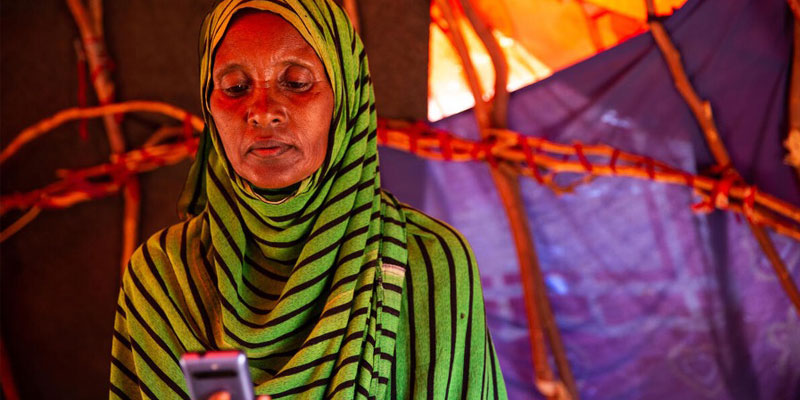This blog was originally posted by the World Food Programme on 10 May 2023 on Relief Web.
The renewal will help empower more women with mobile money and strengthen emergency preparedness as climate shocks and other crises increase.
The World Food Programme (WFP) is strengthening its cash operations and emergency preparedness to better support millions of vulnerable people thanks to a renewed partnership with the global mobile industry through GSMA’s humanitarian and mobile money initiatives.
The partnership, now extended to 2026, comes on the heels of new figures that showcase historic records of acute food insecurity worldwide, with more than 349 million people at risk of going hungry this year.
Sending people money is the best way to help them through crises so they can buy food, fulfil other essential needs, and at the same time build a more resilient future. WFP is the world’s largest provider of humanitarian cash transfers, with more than $3.3 billion transferred to over 50 million people in 72 countries in 2022.
“The agreement will enable WFP to further maximize the impact and inclusivity of mobile enabled services allowing people to select from a variety of different mobile money providers, and receive safer cash transfer support from WFP,” says Jay Mahanand, WFP CIO and Director of Technology.
“Putting more money into women’s hands is transformative. When women receive money in their own mobile money wallet, it means that they can save, and access other financial services like remittances, credit or insurance. They gradually have the possibility of building a future where they no longer need to rely on humanitarian assistance. The partnership with the GSMA will allow us to send more people money in hard-to-reach places,” says Edith Heines, Director of WFP’s Cash-Based Transfer Division.
This partnership will also strengthen the WFP-led Emergency Telecommunications Cluster (ETC) by providing humanitarian partners greater visibility over local network coverage, helping emergency preparedness and response efforts.
WFP’s partnership with the GSMA dates to 2015 with the launch of the Humanitarian Connectivity Charter (HCC), a GSMA-led initiative aimed at strengthening access to communication and information for those affected by crises.
“The World Food Programme has been a longstanding partner of our UK FCDO funded GSMA Mobile for Humanitarian Innovation Programme. We have seen the transformational impact of collaboration between our mobile industry GSMA members and WFP to reach people with humanitarian cash assistance in areas hardest hit by humanitarian crises. Through our renewed partnership, we will aim to reach millions of people with life saving digital humanitarian assistance. We will continue to provide access to connectivity in times of emergency through our collaboration with the Emergency Telecommunications Cluster, expanding our focus on disaster preparedness as the world faces increase prevalence and severity of natural hazards, ” says Kimberly Brown, Head of GSMA’s Mobile for Humanitarian Innovation Programme.
How sending women money helps them overcome economic challenges
Across Somalia, WFP and the government help 200,000 families build resilience to shock by sending cash transfers through mobile money accounts primarily to women on behalf of their families. WFP is currently rolling out the GSMA’s Mobile Internet Training Toolkit to empower women with digital financial skills.

Halima and her family are among the thousands of people who left their homes after battling against unrelenting drought.
Gradually, she and her family watched their crops wither to husks and their 60 goats perish. The goats were the family’s ‘bank account’, savings that could be sold to get some money during hard times, and dowries for the marriages she hoped her daughters would make.
When they were gone, Halima was left with nothing. There was nothing to stay for, there was no food in the village and so Halima and her five children travelled to a camp for displaced people in Dolow in Somalia in the hope of finding food.
With thousands of others, Halima receives assistance from WFP via her own mobile money account that she manages directly through her phone. Receiving cash transfers digitally meant Halima could choose how best to spend her money while also accessing other life-enhancing financial services such as savings, credit and remittances.
“Mobile money is an advantage for us because you can use it for many things in addition to food for the household. For example, if I get sick, I can use it for medication. I can also use it for health expenses for the children. It’s something that I have in my hands, and I can save some money to use for other purposes,” says Halima.
The ‘other purpose’ turns out to be a small business. After saving US$5 to U$10 from her mobile money transfer every month, and with some additional credit, Halima was able to build a small hut from metal sheets and wood. Now she sells small items like pens, batteries, tomatoes, and stock cubes from her little store.
“It’s going very well, and when the stock in the shop is coming to an end, I get my assistance just in time and go to the retailer to pay off previous credit and purchase new stock,” says Halima.
Halima’s story is echoed by her counterparts around the globe. Women who, despite overwhelming hardship, can build futures for themselves and their families when they receive money in their own accounts that they manage, made easier with ongoing support through partnerships developed with GSMA members such as financial inclusion partners.
When women are financially and economically empowered, everyone benefits. Economies grow, more girls are kept in school for longer, fewer children are forced into early marriage, and children’s nutrition improves. Women’s potential is enormous. Unleashing that potential means that poverty goes down and, with it, hunger.


